Pianist Mike Garson performed over one thousand concerts with David Bowie, more than any other person. He joined Bowie’s band for the Ziggy Stardust tour, and played on the Aladdin Sane, Diamond Dogs, and Young Americans albums. He re-entered Bowie’s orbit in the 1990’s, and played on Bowie albums including Outside, Earthling, and Reality. You can hear Garson’s diverse piano skills on Bowie songs ranging from “Aladdin Sane” featuring his avant-garde solo, to “Young Americans” and its Philly soul splendor, to the frenetic “Battle For Britain (The Letter)”
Garson has also recorded and toured with a number of other notable artists, including Nine Inch Nails and The Smashing Pumpkins, and has released a number of solo albums. He has composed over 5,000 pieces of music in virtually every imaginable style.
This interview with Mike Garson was for a preview article for noozhawk.com for the concert “Cancer: The Urgency of Now ” at the Lobero Theatre in Santa Barbara on 11/2/18. It was done by phone on 10/19/18. It complements a previous interview with Mike Garson, available here.
Jeff Moehlis: I really enjoyed the Bowie Celebration show in Ventura last month. How did that tour go for you? Was it as much fun for you as it was for the audience?
Mike Garson: It was a lot of fun, and it was an interesting thing because the show you saw the first concert. When we’re on tour, I sort of have a game with myself which is, can I make every show better than the one before, in some way or other? Sometimes you can’t do that right across the board, but some aspect always should be a little better than the one before.
JM: Well, it sounded great even for the first show.
MG: Yeah, because we had just come out of three days of rehearsal, so we were tight. Plus, you know, I had been working on the music for months prior. I’m glad you got to see that.
JM: The singers are all great. For me, it was especially moving to hear Gaby [Moreno]’s interpretations of David’s songs.
MG: I think she’s pretty magical, as you recognize. She’ll be on this Santa Barbara show. I’m very happy to have her, because sometimes it’s hard to get her because she has her own career, and she travels a lot in South America and her home country Guatemala. She’s a busy girl, but on this particular show on November 2 she’s going to sing this lullaby that I wrote for my daughters. It’s just so beautiful when she does it.
JM: Can you give us an idea of what we can look forward to at the show at the Lobero Theatre?
MG: It’s a cancer benefit for the Hammeras Group. This lovely lady Candy Hammeras helps children who have brain cancer to get the best help in whatever hospital in the United States is best for their particular case. So it’s a fundraiser from that viewpoint. We did one last year in Los Angeles, and we’re doing this one 8:00PM on November 2nd. There will be a couple of speeches, but essentially she wants it just about the music. She just likes to bring awareness to people regarding that whole subject, which of course almost everyone somehow, someway, family-wise or friend-wise, gets affected by that horrible disease.
I have a great band. I have Denny Seiwell on drums, who played with Paul McCartney in Wings in the 70’s, believe it or not. He’s also a great jazz drummer – because I’ll be doing some more jazz in that show than I normally do. And Marlon Martinez, he’s a great young acoustic upright jazz bass player – he’ll be with us. I have a great violinist named Drew Tretick. He’s a terrific violin player, like a virtuoso soloist.
And then I have four singers. I have Gaby, and I have Joe Sumner, I have Brett Hool, and I have a wonderful singer from Lebanon who lives in the States named Mayssa Karaa. She’s going to sing a song that we wrote together. So that’s the line-up. She sings beautifully.
We’ll have a bunch of Bowie songs we’re going to do, but in a slightly different way, because it’s not an electric bass, and we don’t have an electric guitar. It’ll be a little more acoustic. And there will be a couple of my own pieces, and a few jazz things, plus some little surprises throughout the night that I might throw in. So that’s the show. I’m in the middle of rehearsing for it and putting it together.
We’re streaming it that night for those who can’t make it, and then we’ll have that video for the foundation so they can use it however they want for fundraising.
JM: Obviously cancer is a very serious topic, and it’s great that you can help people to learn about this program.
MG: It should be a lovely show. When we did it last year it was with a little bit different personnel, but people loved it. I’m very much looking forward to doing it.
Additionally, for people who might want to come to another show, on November 4th, in San Pedro at the Warner Grand Theatre I’m doing another benefit for special needs adults. It’s a wonderful foundation called Able ARTS Work. They work with music and painting with a lot of severely autistic adults, and with many other diseases like cerebral palsy and what have you. This group just has unconditional love. They work with these people who are in pretty rough shape, and they give them this music and art and painting. They get a chance to really feel like they have a purpose.
It’ll be this same band, plus Jim Walker on flute, who’s a marvelous virtuoso – he played with the LA Philharmonic, and he did 600 films in Hollywood, all the John Williams films and Hans Zimmer. A great flute player. Then I have a string quartet, and the same singers and the same band. So it’s a little bigger. That one, half of the show is some Bowie music, but the other half I’m doing a new piece called the Symphonic Suite for Healing No. 2. I wrote one four years ago, so that was No. 1. This is sort of a premiere of that piece. It’s one of those weekends – it doesn’t happen very often – where I have two charities I’m working for.
JM: David Bowie died of cancer…
MG: And so did Mick Ronson.
JM: It’s striking that cancer does affect so many people.
MG: I just look forward to the day that it’s a thing of the past, like polio and other things. They’re getting better with it, but I just hope that sooner than later it’s resolved. My mom passed from it, and I have friends as we speak dying of it. It’s just a horrible disease. You try to contribute a little as best you can. There’s thousands of organizations of people trying to help in that area. So this is just a small contribution on my part. It brings awareness, and that helps.
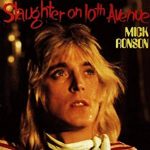
JM: Last time I talked to you, I asked a lot of questions about David Bowie because it was for a Bowie show. But you mentioned Mick Ronson, who was such a great guitarist. Can you tell me a bit about what Mick was like, and what it was like working with him?
MG: You know, I always call Mick the “unsung hero”. He was a total gentleman, one of the sweetest people you’d ever want to meet. Very humble, opposite of how he came across onstage, which is with such presence and bravado. Great guitar playing, wonderful support vocals for David when they sang together – the blend was amazing. He just was a kind guy.
I actually was pretty lucky, because I toured with him separate from David, with his band. He also did two albums which didn’t come out in the States until way after he passed. One was called Slaughter on Tenth Avenue, and the other was called Play Don’t Worry. I played on both of them.
We were very close. He would take me out to dinner in the ’70’s. He gave me some of the best advice of any other musician I’ve ever worked with. He told me, “Don’t do too much studio work as the years go on, because you become white toast if you just get used every day by this one and that one. Just pick your spots, and be the soloist you are.” And I followed that.
He also was the one who auditioned me for David Bowie at the piano on the song “Changes”. It was a seven second audition. I played a few notes of the intro, and he said, “You have the gig.” It was one of those highlights of my life.
We lost Mick in the ’90’s, and David in 2016. Not a good thing, cancer. I would be doing this anyway, but that also makes it more real to people.
JM: I really like the album Slaughter on Tenth Avenue. Could you share some memories of working on that album?
MG: I have a strong memory of doing the title track “Slaughter on Tenth Avenue”. That was a song he loved. It was written by a famous composer from Rodgers and Hammerstein. It was Richard Rodgers who was the songwriter, who wrote the melodies. He did all those Broadway shows that came out in the ’40’s and ’50’s and ’60’s. He was a great composer, and he wrote this semi-classical piece that both Mick and I had learned when we were 12, 13 years old. I had learned it on the piano. And then Mick decides to do it like a rock piece.
I remember working on the piano part which is fairly involved – it’s a complicated piano part – I remember working on it one fine night in France somewhere. I think it was called the Chateau, where Elton John did many of his albums. With Bowie, I think we did Pin Ups there. Anyway, we were working on that. I worked on my piano part from midnight til 6:00AM. Six hours to get that part right. Normally I get things done in one or two takes, but something was not right with my brain because it took me that long, or Mick just had a vision and it had several parts to it. That’s the memory I recall.
Also, Mick, how he arranged all the music, and wrote some of it, and sang on it, and produced it. He was like a complete musician. People don’t realize that he wrote the string parts on “Life on Mars”. He wrote the strings on “Quicksand”.
JM: It’s striking how David always had such amazing guitar players in his bands, Mick, of course, being one. Overlapping with you, there was also Earl Slick, and Carlos Alomar, and later on Reeves Gabrels. How did Bowie find these amazing guitarists? Or did they find him?
MG: David was what I would call the ultimate casting director. He never had a bad musician. [laughs] Luther Vandross sang in the band with us. It opened up his career, which turned out to be enormous. Dave Sanborn on alto sax. He just had the ability to know who would be the best musician for the album he was doing. He also was a pretty good rhythm guitar player himself. On Diamond Dogs, David is playing most of the guitar.
He just had the gift. Picture 1972, and me landing on Aladdin Sane playing this crazy piano stuff. That was never ever thought of or done on any album prior. For him to have that kind of a vision, and to have someone like Mick Ronson or Earl Slick play that kind of rock guitar, playing lead guitar, and then go to someone who was as funky as Carlos Alomar, who’s got just a great feel, and then to have someone as wacky as Reeves. He had Stevie Ray Vaughn for a while. It’s not something that’s coincidence. He had a gift for finding these great players, and maybe those great players had a wish to work with him. It’s probably synchronistic that way.
JM: He didn’t overlap with you, but there was also Robert Fripp who played on the “Heroes”. I would imagine that if David Bowie gives you a call and says, “Hey, do you want to come and lay down a track?”, you say, “Of course!”
MG: No one ever turned down David, assuming they weren’t recording or working with their band at that moment. Ultimately anyone he asked for usually wanted to do it, whether it was Bing Crosby singing a Christmas song with him, or Donny McCaslin, this great sax player – he did Blackstar with his band with David. Or drian Belew who did one album. David was kind of like Miles Davis. He kept moving forward. He kept having all the best players. Like I said, he was the perfect casting director. He always found who was right for what album. Sometimes he’d be away from musicians for ten, fifteen, twenty years, and call them again, and that was the same with producers, too. It was the same in my case. It was the same in Tony Visconti’s case. Earl Slick would disappear for twenty years, and he came back. So David would recycle.
Had he been alive, we would be going out doing an Outside album again, because he wanted to do a trilogy of that music with Brian Eno and myself and Reeves. We’d be out there touring it right now. So the next best thing is for me to put some of the alumni together and tour, with Mike Garson and friends, and these benefits. Even when I’m doing my classical music or my healing music, I’m always throwing in some Bowie. I never did that when he was alive, and I was asked to play in 20 different tribute plans, and I never accepted one because I was playing with David. But the next logical thing is to work with great singers, and just play his music.
Sting sat in with us a few years ago, and he sounded amazing. Ian Astbury sat in with us – he was terrific . Perry Farrell from Jane’s Addiction, which was great. Recently, Evan Rachel Wood. the actress, sang with us, and she’s going to be on some of the concerts when we do this alumni tour starting in January through March. I have 52 shows coming up [laughs] in the next five, six months. So it’s a busy period. And it’s nice to be continually keeping his music alive, because he was just a great songwriter, separate from all of his talents. He was a Renaissance guy. He was an amazing songwriter, so to play these songs and have the fans singing every one of the words is a treat.
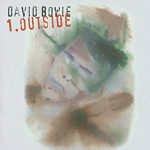
JM: You mentioned Brian Eno as a part of recording the album Outside. He always claims to be a non-musician, and he certainly doesn’t play keyboards like you do. What are your thoughts on working with him, and what he brought to a recording like Outside?
MG: He’s a genius in a whole different way. When we did the Outside album, you talk about keyboard playing. I was playing this gorgeous nine foot Steinway piano, concert grand, and right behind me was Brian Eno on a Yamaha DX7, a little keyboard from the 80’s. Everyday he would go to the music store in Switzerland – we were in Montreux, and he’d find another little gadget, a little box, and he’d connect it to the DX7. I’d play all this crazy classical avant-garde jazzy music, and in my earphones I’d hear “beep-beep, beep-beep”. I’d hear these sounds, and they were always perfectly appropriate. So, what can I say? He claims that the studio and the board that you’re running to record everything, that was his instrument. He’s right.
And he just was a visionary. Look what he did with U2, and Music For Airports, and all the work he did with David. He’s just a great, great creative visionary. I had a lot of fun hanging with him. He’s a great guy.
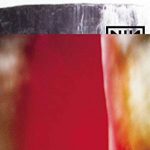
JM: I know you mostly through your playing with David, but you also played with Nine Inch Nails and Smashing Pumpkins. How did you end up playing with those bands?
MG: Every rock band I’ve played with, aside from obviously David, were influenced when they grew up by David, and consequently they knew my piano playing. So that’s how I got every one of those gigs. They all, when they were 11, 12, 13 years old, knew my playing, and they had a desire to work with me when they were successful with their careers. So that’s how they all came about.
Playing with Trent Reznor… I’ve done various movie projects for him like Gone Girl, and I just did a new one that’ll be out next year where I play the opening theme for Watchmen, which will be on HBO next year. Trent was a real genius, and David told me to keep my eyes open for him. David knew that he was going to be great. David, again, was a visionary, and he saw that. So it came about because of him. Trent reached out to me. So it’s still happening.
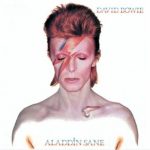
I’ve played on albums with probably two or three hundred artists. Maybe you would know ten or twenty. Some are from Europe and Japan and Russia. Some are a little known, or very known, some very unknown, but all because of David. It was just kind of bizarre in a way. And all because of my playing on “Aladdin Sane”, and then the few who know Outside, obviously which is an amazing album.
JM: I remember up in the Bay Area I saw a show where first it was Nine Inch Nails, and then it was David Bowie, on the Outside album tour. That was amazing! That was the first time I’d seen Nine Inch Nails. It was funny because Trent was so aggressive with his keyboard that it seemed during every song a roadie would have to come and swap out the keyboards to keep it running.
MG: Yeah, I would watch their show from the side of the stage in amazement every night, and watch those keyboards and guitars, occasionally, get destroyed. He’s much calmer these days, but, boy, he was in rare form in those days. Just a very, very creative, beautiful guy. I like him a lot.
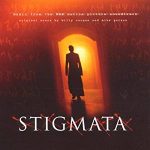
Also, Billy Corgan, I loved working with him. He’s a great songwriter, and sometimes we’d be in Portugal or somewhere – people didn’t know this – but we’d play on a tune, and maybe for 40 minutes he’d be improvising on the guitar. We’d just be backing him up. I also did the movie Stigmata with Billy Corgan in 2000. We wrote the score together. I went to see him recently with his band. Jimmy Chamberlin, his drummer, is a good friend of mine – I played on his album. There’s probably 80 hours of recorded music that I’ve done with Billy from a tour that’s never been released, that one day he’ll put out. And also, there’s at least 15 tracks from Trent that I played on that he never released during the Fragile days. So someday maybe all that will show up. These guys are great producers and they’re great visionaries, so they know when and where and how to release something. Sometimes they just hold them back and it becomes part of history, and other times they’re releasing takes 20, 30 years later.
JM: Your playing involves a lot of improvisation. What draws you so strongly to that? Where does that impulse come from?
MG: For many years I wrote music out, like a normal composer, and I found that I’m better at improvising. It’s probably because I started improvising at 14, and I’ve never stopped doing it. So you do something for so many hundreds of thousands of hours, you develop that skill.
It’s not just that I’m improvising. The reason I like improvising is I’m able to play how I feel at any given moment. That’s why I do it. The craft is connected with improvisation, and that takes a lot of ability. There’s nothing worse than bad improvisation. I’d rather hear something written than bad improv. But good improv could actually supersede good composition, because it’s done in the moment based on the environment and everything around you.
And that’s actually what me and David had in common. Things would come to him out of nowhere when he was writing a song, or singing, or onstage. So that’s what we really shared, and that’s why my first audition, when I was only hired for eight weeks, led to the longest musician with him – 1000 shows, 19 albums. That’s probably because of our thinking regarding the creative process.
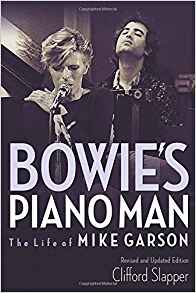
JM: I’ve started to read the biography about you, Bowie’s Piano Man. Is it weird to read about yourself, and did you learn anything about yourself from reading it?
MG: That’s a great question. First of all, I haven’t read the book. I certainly answered any questions that I was interviewed about by Cliff Slapper, the biographer, and I gave him a lot of hours. I maybe read 5, 10 pages. It’s difficult. I used to make the joke that this should come out after I was dead. I was sort of not wanting the book to come out for 10 more years, but it just seemed appropriate. And then after David passed, he did “Version Two”, which has an additional hundred pages. And I can see in a few years doing “Version Three” because my career is still going on and developing, and new things keep happening.
But in terms of the uncomfortableness to read it, you know, you normally think, “He’s dead, and this is what he did.” So to be alive… There’s something nice about it. But what it does, if I really am to be honest, the book shows people or myself what I’ve done to date, which in a way then allows me to move forward from there, because I don’t want to repeat the same record. So it allows for more growth in me, because you sort of get it off your chest, and now that you’ve said this and you’ve done that and you’re a big shot here and this and that and this and that, what are you going to do now? Are you going to just rest on your laurels and talk about the book, or are you going to move forward? That’s where it’s useful to me.
Where it’s uncomfortable is where, you know, things like describing this guy who had a nice life and a good career and interesting stories, but big deal. To me, it’s like the improvisation and what I call my “now music”. It’s like how you feel in the moment going forward. But I think Cliff wrote the book with my help with the intention of wanting to inspire future generations of musicians and artists, more so than the guy in the street. Although for the guy in the street, if it inspires them to do things in their life that are better, then I’ve also done my job. But it was written with that intention for inspiring.
And also to set the record straight on certain things, because my life is quite unusual for a musician. No drugs, no alcohol, family man, married 50 years, 7 grandkids. It’s like, that’s not what people think of as rock ‘n’ roll – drugs, sex, and all that stuff. It just wasn’t my thing, and so it was an intention to say you can create great music and you don’t have to be messed up and be in rehab ten times. So I had a few different agendas.
Of course the biographer and the publishers, they always want to know all the gory stuff and the gossip, but I told them I wouldn’t do the book if that’s what it was about. And there is no gossip in the book. That makes less sales, but it felt good to me. Because you can go read a hundred books on David Bowie and get all the gossip you want. I haven’t read them, but I know that it’s in those books.
JM: The book definitely does come across as inspirational, which is a lot of why I’m enjoying it so much. You don’t have to live in the past. You can take advantage of opportunities that arise now, and look to the future.
MG: I mean, that’s a good way for anybody to live. It’s very difficult, and when you have been well-known or famous, and you see it in older folks all the time, they’re only talking about their past. If I find myself doing that too much, I know I’m stagnating in the moment, so I stop and just look at what I can do now that will move me forward. It takes a lot of discipline, because it’s very easy to get complacent and just lay back and hang, and just rest on your laurels. And many people are more than willing to accept that, because you have done a good day’s work, so to speak, in the past. But it makes me uncomfortable.
If I’ve done something great yesterday and I feel good that night and maybe in the morning, but by noon the following day if I’m not doing something new, creatively, I actually get depressed. So I have a barometer in me that refuses to let me settle. So we’re talking now, saying some new stuff, productive stuff – I’ll feel good for an hour or two. By three o’clock if I’m not thinking about a new piece or a concert or this or that, I’m actually not a happy camper. Maybe that’s not healthy, but that’s how it is for me.

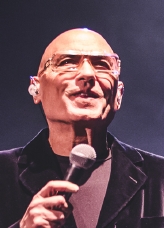
Discussion
No comments for “Interview: Mike Garson, Part 2”